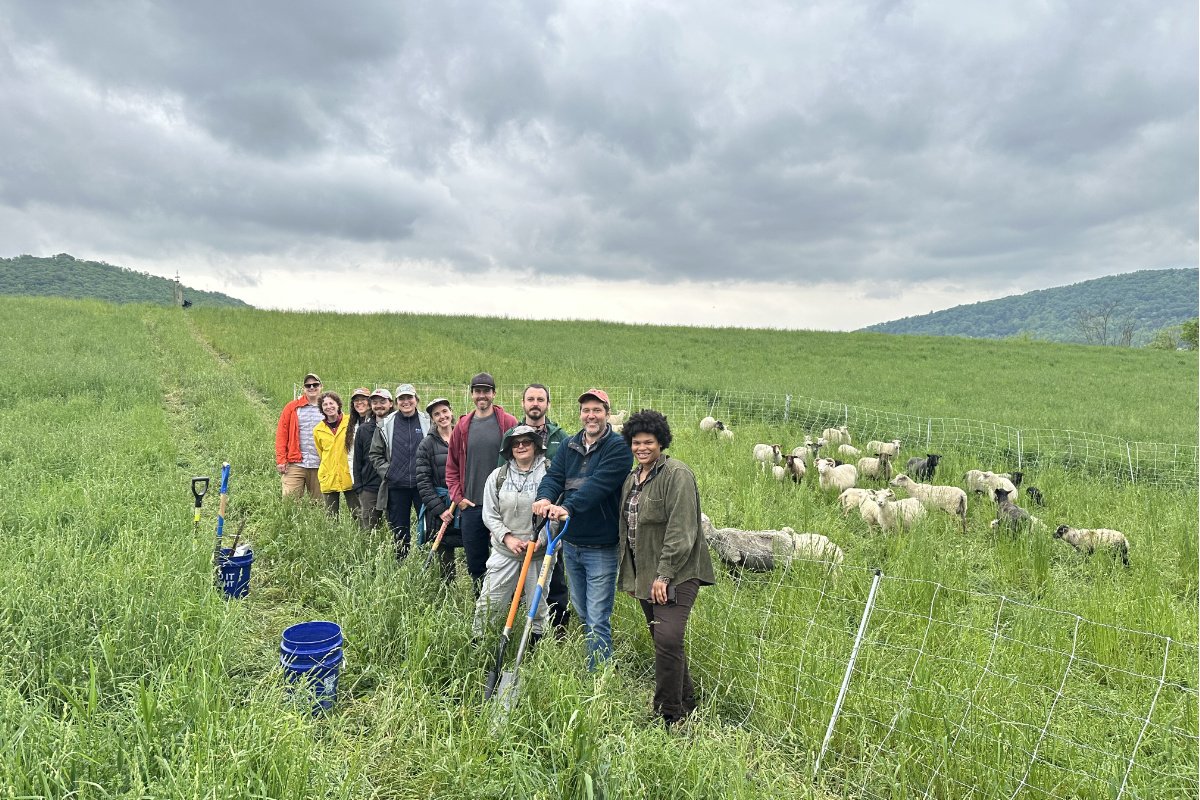Thousands of farmers across the country were enrolled in dozens of projects and expecting USDA payments to implement conservation practices. Now contracts are being cancelled, and farmers face uncertainty.

Thousands of farmers across the country were enrolled in dozens of projects and expecting USDA payments to implement conservation practices. Now contracts are being cancelled, and farmers face uncertainty.
February 26, 2025

Pasa Sustainable Agriculture’s Climate-Smart Technical Assistance team gathered to train at a sheep farm in Mifflin County, Pennsylvania. Photo courtesy of Pasa Sustainable Agriculture.
April 15, 2025 Update: After nearly three months of frozen payments, the USDA announced that it would officially cancel the Biden-era Partnerships for Climate-Smart Commodities program. However, the agency said it would review existing projects based on new criteria and continue to fund those that qualify under a new name, the Advancing Markets for Producers (AMP) initiative.
Expand your understanding of food systems as a Civil Eats member. Enjoy unlimited access to our groundbreaking reporting, engage with experts, and connect with a community of changemakers.
Already a member?
Login
March 20, 2025 Update: Pasa joined 10 other nonprofits and six cities in filing a lawsuit against President Trump, Elon Musk, DOGE, and multiple federal agencies to challenge the freeze on contracted grant funding across the federal government.
February 28, 2025 Update: After failing to respond, DOGE later updated the record, claiming that the Clark Group contract cancellation has saved the administration $2 million. Civil Eats is not able to verify this amount, and other reporting has found DOGE’s accounting contains many mistakes.
About 150 farmers, spread out across 15 East Coast states, have already enrolled in Pasa Sustainable Agriculture’s climate-smart farming project, which was funded by the Biden administration’s Partnerships for Climate-Smart Commodities Program. Another 900 have applied. Working with about a dozen partner farm organizations in other states, Pasa is slated to spend more than $40 million supporting many more farms over the five-year contract period.
But last week, farmer and Pasa Executive Director Hannah Smith-Brubaker sounded exhausted as she relayed the state of things. For a month, the organization hasn’t been able to get grant disbursements based on money they’ve spent or get any answers from the U.S. Department of Agriculture (USDA) as to when the freeze may end. So, they’ve been making payments to farmers with no way to fund them, while pausing new enrollments. “We’re going to run out of money eventually,” she said.
“Gutting USDA programs and personnel and hanging our farmers and rural America out to dry is not the solution.”
In the midst of all that, another shoe dropped: Last week, a Pasa staff member was browsing the list of canceled contracts posted by the White House cost-cutting initiative, the Department of Government Efficiency (DOGE), when they noticed a familiar name. As first reported in Civil Eats’ Food Policy Tracker, DOGE said it had canceled an $8.2 million contract for “environmental compliance services” with the Clark Group.
Pasa relied on the Clark Group to provide third-party reviews of farmers’ plans to implement popular practices. Those reviews are required by law before a farmer installs new fencing to improve grazing management, for example, or plants buffers along waterways to prevent runoff and create habitat. When Pasa reached out to the Clark Group, the company said they could no longer provide the service.
“Even to this point we have not been notified by USDA about this,” Smith-Brubaker said. “It ties our hands in terms of being able to help about two-thirds of the farmers in our program. And we’re still sort of figuring out what the repercussions will be for people who are mid-process who have already paid for things to be installed.”
Multiple sources who did not want to be identified because they thought speaking up might jeopardize their funding told Civil Eats that the Clark Group was providing the same reviews to many other groups working on Climate-Smart Commodities projects. The projects mentioned include several smaller East Coast projects and several larger projects that work with farms across Eastern, Midwestern and Southern states.
That jeopardizes payments intended for thousands of farmers producing fruits and vegetables, row crops, milk, and meat, most of them on small farms.
It’s one example of how, while the USDA has begun releasing a trickle of funds for farmers in other grant programs, there are already starting to be more permanent, long-term impacts of funding cuts and contract cancellations.
Whether the agency decides to cancel the Climate-Smart Commodities program altogether or the cuts lead to a slow unraveling or shrinking of the program, the impacts will be significant.
Many assume the Climate-Smart Commodities Program is likely to be canceled altogether, especially since the agency has already started scrubbing the term “climate change” from its website. But questions remain as to whether that will happen, especially because President Trump has focused specifically on clawing back Inflation Reduction Act dollars, which did not fund this program.
And if the USDA does cancel it, it’s unclear whether payments already requested will be honored. Since the contracts are legal documents, cancellation could also prompt lawsuits.
In the meantime, the Clark Group contract and other related cuts represent stitches being ripped out of the interconnected federal programs and infrastructure that hold it all together. For example, another farm group involved in a Climate-Smart Commodities project officially dropped out last week after the length of the funding freeze and losing a critical staff member due to the cancellation of a different USDA program made it impossible to continue.
Neither the USDA nor DOGE responded to questions and requests for comment, nor did House Agriculture Chairman G.T. Thompson (R-Pennsylvania), whom Smith-Brubaker reached out to for help.
“Farmers want to know whether they can trust the U.S. government to do what it promised to do. They want to know whether the money and services they have signed agreements on will be delivered, especially after President Trump said he wasn’t going to withhold payments to farmers,” said Angie Craig (D-Minnesota), the House Agriculture Committee’s top Democrat. “Gutting USDA programs and personnel and hanging our farmers and rural America out to dry is not the solution.”
Whether the agency decides to cancel the Climate-Smart Commodities program altogether or the cuts lead to a slow unraveling or shrinking of the program, the impacts will be significant. Farm groups across the country have been spending considerable time and resources building up infrastructure and enrolling farmers to seize the $3.1 billion opportunity laid out by the Biden administration.
Just a few weeks ago, the team at Glynwood Center for Regional Food and Farming was anxiously trying to understand why payments for their Climate-Smart Commodities Program work were paused. Now, they’re throwing in the towel.
“This means the nine farms who were ready to go into contract will not receive the funds they had planned on, in one case as much as $170,000,” said Megan Larmer.
Sources confirmed to Civil Eats that projects that involve thousands of farmers across a wide range of states, from Missouri to South Carolina to Vermont, are likely impacted.
While Glynwood’s implementation was not impacted by the Clark Group contract cancellation because the organization was working with a different provider for environmental reviews, the organization was struggling to hang on, waiting for payments to resume. Then, another program they relied on to implement their project was cut, illustrating the interconnected nature of USDA support.
On February 14, Glynwood received a letter from the Corps Network, an organization that had partnered with the USDA to run President Biden’s Working Lands Conservation Corps. The USDA and the Corps Network had placed young people in the Conservation Corps in positions with 28 farm organizations.
One of those young people landed at Glynwood, where their role was running the administrative duties of the Climate-Smart Commodities project.
In the letter, the Corps Network said that effective March 13, it would be terminating its sub-agreement with Glynwood and would stop reimbursing the organization for the employment costs after that date. The letter said the Network had received verbal notice from the USDA that the program would be terminated.
“Additionally, as of the date of this letter, The Corps Network is awaiting $500K in receivables from Natural Resources Conservation Service, USDA with no estimate of when those bills will be paid,” it said.
At least one other Climate-Smart Commodities project was also relying on the help of a Corps member, a source told Civil Eats, and the young people in the Corps were working on other farm projects that will likely be impacted.
But the Clark group contract is a bigger deal because of its broader reach.
Across the whole program, the USDA approved more than 140 projects, many of which involve a dozen or more partner organizations working with farmers in multiple states. It’s unclear how many of them relied on the Clark Group for environmental reviews, and the Clark Group did not respond to Civil Eats’ inquiries.
Some groups told Civil Eats they were not working with the Clark Group. But sources also confirmed to Civil Eats that projects that involve thousands of farmers across a wide range of states, from Missouri to South Carolina to Vermont, are likely impacted.

Mulching is a conservation practice eligible for technical and financial assistance through Pasa’s Climate-Smart Farming & Marketing Program. Photo courtesy of Pasa Sustainable Agriculture.
Back at Pasa, Smith-Brubaker estimates she will have to lay off around 30 individuals working on her project. Many of those are people who were gaining experience as on-farm providers of technical support, and she emphasized the importance of growing that next generation of individuals who can support farmers in that way. “We imagined that these folks then could go on to work at the Natural Resources Conservation Service after this project,” she said.
Still, she said the more immediate loss will be the $20 million in funds they were set to distribute to farmers and another $20 million in free technical support.
The thing that makes her angriest is that while DOGE tweeted that canceling the Clark Group’s contract would result in taxpayer savings, in fact, its own accounting showed that the full payment to the consulting group had already been made. In other words, the savings accrued by canceling it at this point in time was equal to $0.
Many of the practices Pasa was helping farmers implement would improve soil health, she explained, and every 1 percent improvement in soil organic matter results in around 20,000 additional gallons of water stored in the soil.
“Even if 1 percent of farms across Pennsylvania improve their soil organic matter by 1 percent, you’re talking 43 billion gallons of water that aren’t going into the Chesapeake Bay, for example, or flooding neighbors downstream,” Smith-Brubaker said. It also makes farms more resilient to drought, ensuring they can continue to feed Americans during dry spells, which are becoming more common.
For now, all that is in limbo. “We’re still trying to serve farmers the best that we can,” Smith-Brubaker said, “but you know, there will come a point in time when that’s just not going to be possible.”
“I just don’t understand that,” she said. “In my mind, these are public servants. These are people who are providing not only food but environmental benefits for their neighbors who live downstream from them.”

July 30, 2025
From Oklahoma to D.C., a food activist works to ensure that communities can protect their food systems and their future.
Like the story?
Join the conversation.